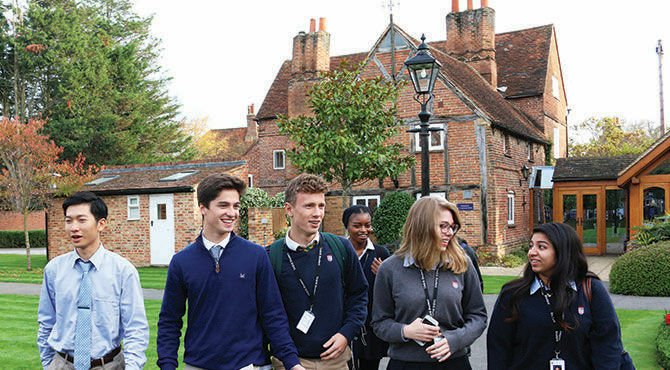Most parents choose to take their children to boarding school in the UK. They believe they will be fully disciplined in studying before they enter university.
For overseas students, UK boarding schools are renowned for being secure and orderly, with some of the greatest teaching staff in the nation and world-class musical, artistic, and athletic facilities.
To study and work anywhere in the globe, students must leave with perfect proficiency in English and a complete sense of belonging in an anglophone setting. Let’s look into how many boarding schools in UK!
Table of Contents
- What is a Boarding School?
- How Much is Boarding School UK ?
- Why Should I Study at Boarding School UK?
- What Advantages Do Boarding Schools Offer?
- How to Pick a Boarding School in The UK for Your Child
- Scholarships for Boarding School UK
- Bursaries for Boarding School UK
- How Much is Boarding School UK Per Month
- How Much is Boarding School UK for International Students ?
- What does Life at Uk Boarding Schools Look Like?
- What are the requirements for a Visa to study in the UK?
- What State Boarding Schools are Available in UK?
- Frequently Asked Questions About Boarding School UK
- Conclusion
- References
- Editor’s Recommended Posts
What is a Boarding School?
A boarding school is a type of educational institution where students live on campus during the academic year, typically away from their homes and families.
In addition to attending classes, students at boarding schools also participate in various extracurricular activities and have access to resources such as libraries, sports facilities, and dormitories. Boarding schools provide a structured environment that fosters independence, self-discipline, and personal growth.
One of the key benefits of attending a boarding school is the opportunity for students to develop strong bonds with their peers and form lasting friendships.
Living near classmates allows for deeper connections and a sense of community that can enhance the overall learning experience.
Boarding schools also often offer rigorous academic programs, dedicated faculty members, and unique opportunities for personal development that can prepare students for success in college and beyond.
Get more about: How Long is Sixth Form in the UK? A Guide To Private Sixth Form In The UK
How Much is Boarding School UK?
Boarding school fees in the UK can vary widely depending on factors such as location, facilities, and reputation.
On average, you can expect to pay anywhere from £20,000 to £40,000 per year for tuition and boarding. Some prestigious schools may charge even higher fees.
It’s important to research different schools and their fee structures to find one that fits your budget and meets your child’s educational needs.
Many schools also offer scholarships or financial aid options to help make boarding school more affordable for families. Don’t hesitate to reach out to schools directly to inquire about their fees and any available assistance programs.
Why Should I Study at Boarding School UK?
In addition to having some of the best teaching staff in the nation and world-class musical, artistic, and athletic facilities, boarding schools are renowned for being safe and orderly settings for students.
The students will be ready to study and work anywhere in the globe when they graduate with perfect proficiency in English and complete comfort in an anglophone environment.
What Advantages Do Boarding Schools Offer?
Although it is commonly known that boarding schools have raised their tuition costs, there are many more ways that a boarding education can benefit a child’s life in addition to providing a high-quality education.
Among the many advantages of boarding schools are:
Gaining independence:
Leaving home can help kids get ready for life as young adults in college and beyond. Excellent facilities are available to boarders, giving them more time and freedom to make use of the school’s options in sports and the arts.
All-inclusive lifestyle:
Although boarding schools can be very expensive, they provide your child with everything they need to live comfortably and learn, including three meals a day, snacks, on-site medical care and wellbeing, laundry, extracurricular activities, and more.
Exposure to various cultures:
In addition to accepting students from the UK, most boarding schools in the UK also accept students from other countries. Children can benefit from this by gaining cultural knowledge and a global viewpoint.
Structured schedules:
Children are given a structured lifestyle at boarding schools. Children are guaranteed to have healthy, balanced lives by having regular hours for education, eating, and personal enjoyment.
Living and learning with other students might help kids develop their social skills and make friends more quickly.
Check out this post: What Time Do Schools Start and Finish in the UK?
How to Pick a Boarding School in The UK for Your Child
Both parents and kids must make significant commitments when attending boarding schools. Make sure the boarding school is a good fit for your child and that they will receive care and assistance if you’re considering sending your child there for his or her education.
When selecting a boarding school, you might wish to take the following factors into account:
Student demographics: Is the school co-educational (mixed) or single-sex? Which do you believe will be more suitable for your child?
Environment: Is the school located in a rural or urban area? Which would your youngster choose: the open green spaces of the country or the social and cultural changes of the city?
Academic ethos: What is the academic ethos of the school, and how are the exam results? Will your child be able to uphold the standards expected of a rigorous academic institution?
Size: What is the school’s size? While larger schools may have a wider range of academic and extracurricular activities, smaller schools typically provide more individualized education and support.
Support for overseas applications: If you’re applying to a school from outside the UK, make sure the institution accepts such applications. The diversity of nationalities represented at the school and the availability of staff with the necessary expertise to assist international pupils are other factors you might want to take into account.
Read: What Happens If You Walk Out of a GCSE Exam?
Scholarships for Boarding School UK
Scholarships are offered by several senior institutions and a few preparatory schools to draw in students who are gifted or intelligent.
They are typically given out following a competitive examination and interview for academic, musical, or artistic achievement, and they typically don’t take financial necessity into account.
The UK invites talented kids from abroad to compete in open scholarship exams. The terms from September to December and January to April of the year before admission are when the schools hold these exams.
See related post: What are Free Schools and Its Purpose in UK?
The exam papers can be distributed to British Council offices across the world, allowing students from different nations to take the test locally.
Scholarships are often given out at 11, 13, and 16, with students already enrolled in school having the opportunity to apply at 13 and 16.
This scholarship is regularly given out at the age of 16 to students who are already enrolled at the school, and grants for new students are issued after an interview and review of their transcripts from their prior institutions, with the need that they meet specific GCSE grade requirements.
Although there is fierce competition, if a student achieves good progress, a scholarship is typically maintained for the remainder of their time in the school.
Bursaries for Boarding School UK
Bursaries, which are funds provided by the school to aid in fee payment, are also offered by a lot of schools. These are typically given out following a family income “means test” and are not exam-related, though academic aptitude will be taken into consideration.
In cases where a child’s financial need is proven and they would not otherwise be able to attend school, bursaries may also be given out in addition to scholarships.
To be considered for a bursary, parents must often fill out an application form with information about their financial situation and supporting documentation, such as capital holdings.
The school will review the application by its bursary policy. The award frequently only lasts until the student has taken the following pertinent public examination; an award given before the GCSE does not always carry over to the A-level.
The majority of schools examine bursaries every year to make sure the reasons for an award still stand.
How Much is Boarding School UK Per Month
The cost of boarding schools in England is undoubtedly higher. The average annual cost of boarding schools is between 20,000 and 30,000 British pounds. Nevertheless, this sum will vary depending on whether you are an American or an overseas student.
How Much is Boarding School UK for International Students?
However, the majority of universities charged between £10,000 and £20,000 (US $12,400 to $24,800) for the bulk of topics.
International postgraduate students’ annual tuition costs ranged from £6,500 ($8,060) to £51,360 ($63,670).
The cost of postgraduate medical education ranged from £7,500 ($9,300) to £54,500 ($67,560).
Fees for MBA programs ranged from £8,500 ($10,540) to £63,000 ($78,100).
But just like with undergraduate tuition, the majority fall within a given range. At most universities, the bulk of postgraduate courses cost between £12,000 and £25,000 (US $14,880 and $30,990) in 2021–2022.
International students‘ tuition costs vary greatly between universities, courses, and levels of study. As a result, it’s challenging to estimate a precise cost.
What does Life at Uk Boarding Schools Look Like?
International and local UK students are typically taught together in boarding institutions in the UK. Pupils who live on campus are referred to as “boarders.” ‘Day pupils’ reside with their families and leave for home after school. This combination contributes to the convivial mood.
Boarding schools typically close throughout the lengthy summer and holiday breaks, and students go back to live with their parents or legal guardians. But certain schools do offer language classes at this time.
During the briefer half-term breaks, several schools remain open. Normal classes are usually not offered, but students can participate in activities and events while being watched over by staff.
Read more: How To Deal With Having No Friends At University
Accommodation
In a boarding school, students share housing with other students; some schools have multiple boarding houses. Both genders have separate quarters. Additionally, there will be at least one house parent who resides on the property and is responsible for taking care of the student’s needs.
Young boarders will likely live in a dormitory or bedroom with other kids. Older boarders frequently have their private bedroom or a small roommate arrangement. Additionally, boarders may have private bathrooms and laundry facilities.
The majority of boarding houses include cozy common spaces where students may unwind, mingle, and watch TV together.
Subjects and Requirements
Three tiers make up the boarding school UK system.
Children in primary school must be four or five years old and no older than 11 or 13. This may also be referred to as elementary school, junior high school, pre-preparation school, or preparatory school.
Students in grades 11 or 13 to 16 attend secondary school. This may also be referred to as high school, senior school, or secondary school.
Most students prepare for GCSE exams throughout their final two years of secondary school (ages 14 to 16). The International Baccalaureate Middle Years Programme or Scotland’s Standard grades and Intermediates are alternatives.
Students ages 16 to 18 are eligible for sixth form. Common names for the two years are Lower Sixth and Upper Sixth. The majority of students take A-levels in sixth form. Alternative credentials include the International Baccalaureate or Scotland’s Standard Grades and Highers.
Among the many subjects offered by boarding schools are math, physics, history, geography, theater, IT, literature, and foreign languages. Universities, colleges, and employers in the UK and abroad highly value all of these credentials.
Application Procedure
Direct applications are submitted to private boarding institutions. For more information on the application procedure, check out the school’s website or get in touch with them. Usually, the local government body is in charge of processing applications for state schools.
While there is no cost for tuition in state schools, boarding is an additional cost. Tuition and boarding are costs associated with independent schools.
Accommodations, food and drink, and laundry are typically included in board prices. A scholarship or bursary may allow you to pay for your education. Inquire about the offerings at the colleges you are considering.
Please verify the entrance requirements on the boarding school’s website since students might need to take an entrance exam or an English course.
What are the requirements for a Visa to study in the UK?
Most foreign students who wish to study in the UK must get a visa.
If you are between the ages of 4 and 17 and want to attend an independent school in the UK, you can apply for a Child Student visa.
Schools should also:
- Be having a spot on a course
- Have a parent’s or guardian’s permission
- Possess sufficient funds to pay for living expenses and course fees
- Originate from a nation that is not a member of Switzerland or the European Economic Area (EEA).
See Also: How Much School Attendance is 1 Day in UK? 1 Day, Week, Month Absent
What State Boarding Schools are Available in UK?
More than 5,000 students can attend one of the around 40 state boarding schools in the UK, which are located in regions including Wales, Scotland, Northern Ireland, and the Scilly Isles.
Some schools offer full boarding beginning at age seven, while others only allow sixth formers to board or offer flexi or weekly boarding.
Junior boarding is only offered at a few state boarding schools. From Year 3 (age seven), students at Royal Alexandra and Albert School. Wymondham College opened a prep school with boarding starting in Year 5 (age nine) in 2020.
This school’s dorm, Underwood Hall, was created expressly for this purpose and “has been specifically designed with a family atmosphere to meet the needs of younger boarders.”
Frequently Asked Questions About Boarding School UK
State-run boarding schools offer tuition-free instruction but charge extra for lodging. While some state boarding schools are free institutions and others are managed by local governments, academies make up the majority of them.
How long does a normal boarding school stay in Britain last? The majority of schools either encourage or demand that students remain for at least one whole academic year. This aids in their integration, linguistic development, friendship-making, and overall enjoyment of their stay.
International undergraduate tuition in the UK* began at £11,400 (US $14,130) per year in 2021/22. This increased to a maximum of £32,081 ($39,770). The tuition for undergraduate medical degrees ranged from £9,250 (US $11,470) to £67,892 (US $84,170).
A British boarding school is an excellent stepping stone for your child if they are eager to enroll in college either in the UK or at a prestigious university abroad. The majority of boarding school pupils in the UK who apply to universities get accepted to their top choices.
Conclusion
The cost of attending a boarding school in the UK can vary significantly depending on various factors such as location, facilities, and reputation. It is important for families to carefully consider their budget and financial resources before making a decision.
While the price may seem daunting at first, many boarding schools offer scholarships and financial aid options to help make education more accessible.
Just in all, the benefits of a boarding school experience, such as academic excellence, diverse extracurricular activities, and personal growth opportunities, can outweigh the financial investment.
So if you are considering sending your child to a boarding school in the UK, don’t hesitate to explore your options and find the best fit for your family’s needs





